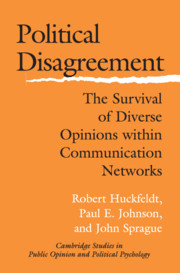Book contents
- Frontmatter
- Contents
- List of Figures
- List of Tables
- Acknowledgments
- 1 COMMUNICATION, INFLUENCE, AND THE CAPACITY OF CITIZENS TO DISAGREE
- 2 NEW INFORMATION, OLD INFORMATION, AND PERSISTENT DISAGREEMENT
- 3 DYADS, NETWORKS, AND AUTOREGRESSIVE INFLUENCE
- 4 DISAGREEMENT, HETEROGENEITY, AND THE EFFECTIVENESS OF POLITICAL COMMUNICATION
- 5 DISAGREEMENT, HETEROGENEITY, AND PERSUASION: HOW DOES DISAGREEMENT SURVIVE?
- 6 AGENT-BASED EXPLANATIONS, PATTERNS OF COMMUNICATION, AND THE INEVITABILITY OF HOMOGENEITY
- 7 AGENT-BASED EXPLANATIONS, AUTOREGRESSIVE INFLUENCE, AND THE SURVIVAL OF DISAGREEMENT
- 8 HETEROGENEOUS NETWORKS AND CITIZEN CAPACITY: DISAGREEMENT, AMBIVALENCE, AND ENGAGEMENT
- 9 SUMMARY, IMPLICATIONS, AND CONCLUSION
- APPENDIX A THE INDIANAPOLIS–ST. LOUIS STUDY
- APPENDIX B THE OPINION SIMULATION SOFTWARE
- References
- Index
1 - COMMUNICATION, INFLUENCE, AND THE CAPACITY OF CITIZENS TO DISAGREE
Published online by Cambridge University Press: 03 December 2009
- Frontmatter
- Contents
- List of Figures
- List of Tables
- Acknowledgments
- 1 COMMUNICATION, INFLUENCE, AND THE CAPACITY OF CITIZENS TO DISAGREE
- 2 NEW INFORMATION, OLD INFORMATION, AND PERSISTENT DISAGREEMENT
- 3 DYADS, NETWORKS, AND AUTOREGRESSIVE INFLUENCE
- 4 DISAGREEMENT, HETEROGENEITY, AND THE EFFECTIVENESS OF POLITICAL COMMUNICATION
- 5 DISAGREEMENT, HETEROGENEITY, AND PERSUASION: HOW DOES DISAGREEMENT SURVIVE?
- 6 AGENT-BASED EXPLANATIONS, PATTERNS OF COMMUNICATION, AND THE INEVITABILITY OF HOMOGENEITY
- 7 AGENT-BASED EXPLANATIONS, AUTOREGRESSIVE INFLUENCE, AND THE SURVIVAL OF DISAGREEMENT
- 8 HETEROGENEOUS NETWORKS AND CITIZEN CAPACITY: DISAGREEMENT, AMBIVALENCE, AND ENGAGEMENT
- 9 SUMMARY, IMPLICATIONS, AND CONCLUSION
- APPENDIX A THE INDIANAPOLIS–ST. LOUIS STUDY
- APPENDIX B THE OPINION SIMULATION SOFTWARE
- References
- Index
Summary
There is a limit to the legitimate interference of collective opinion with individual independence; and to find that limit, and maintain it against encroachment, is as indispensable to a good condition of human affairs as protection against political despotism.
John Stuart Mill. 1859 (1984). On Liberty. New York: Penguin Classics, p. 63.Democratic electorates are composed of individually interdependent, politically interconnected decision makers. These individual citizens do not go it alone in democratic politics – they depend on one another for political information and guidance, and hence political communication and persuasion lie at the core of citizenship and democratic politics. At the same time, the vitality of democratic politics also depends on the capacity of citizens to disagree – to reject as well as to accept the viewpoints of others. The questions thus arise, are citizens capable of maintaining durable patterns of both agreement and dissent within their closely held social groups? What are the circumstances that give rise to both agreement and disagreement within the networks that connect citizens in ongoing patterns of political communication?
The capacity of citizens and electorates for tolerating political disagreement constitutes a central issue in democratic politics. The model of a free, open, and democratic society is one in which political issues are fully explored, and political debates are fully aired. In such a society, citizens are open to persuasion but sympathetic to ongoing disagreement, the social boundaries on political viewpoints are fluid and shifting, and individuals encounter the full spectrum of issue positions and political viewpoints.
- Type
- Chapter
- Information
- Political DisagreementThe Survival of Diverse Opinions within Communication Networks, pp. 1 - 24Publisher: Cambridge University PressPrint publication year: 2004



